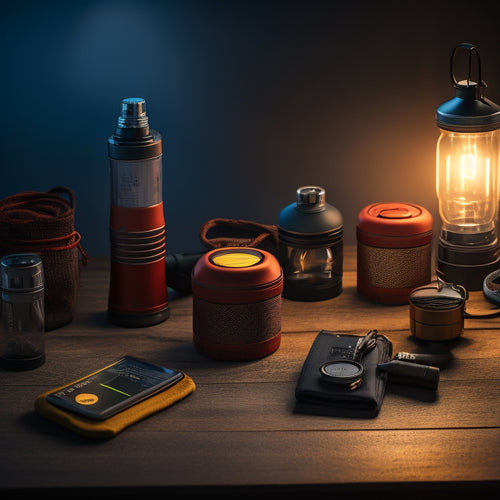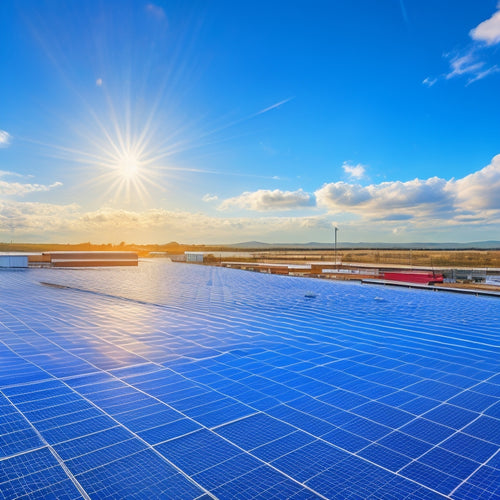
Why Regular Solar Panel Maintenance Matters
Share
By maintaining your solar panels regularly, you can guarantee they operate at peak performance, maximizing energy efficiency and reducing energy losses. Clean panels produce up to 25% more energy, and regular checks for loose connections and damaged components enhance efficiency. Neglecting maintenance can lead to premature degradation, reduced energy output, and even fire hazards. By staying on top of maintenance, you'll not only protect your investment but also enjoy ideal energy production, reduced electricity bills, and a longer lifespan for your panels. As you investigate the importance of regular maintenance, you'll uncover the key to revealing the full potential of your solar panel system.
At a Glance
- Regular solar panel maintenance boosts energy efficiency and output, minimizing energy losses and ensuring peak power production.
- It prevents premature degradation, maintaining investment value and ideal performance levels, especially in hot and humid climates.
- Maintenance helps manage warranties and certifications, ensuring compliance with local regulations and protecting against failures.
- Regular checks reduce the risk of solar panel fires by preventing electrical arcing and ensuring secure connections and components.
- It optimizes power output and performance through continuous monitoring, identifying potential issues early, and enabling energy independence.
Boosts Energy Efficiency Ratings
By maintaining your solar panels regularly, you'll guarantee peak power output and minimize energy loss.
This is because clean panels with no debris or defects can operate at their maximum capacity, resulting in higher energy yields.
Furthermore, regular maintenance helps to identify and fix potential issues, such as Energy Efficiency problems, before they lead to significant energy losses.
Optimal Power Output
Your solar panel system's ideal power output is important for maximizing energy efficiency ratings. This is where regular maintenance comes in, as it guarantees your system operates at its best level.
One important aspect of maintaining best power output is solar panel cleaning. Dirty panels can reduce energy production by up to 25%, making regular cleaning a must. Additionally, shading analysis is essential in identifying areas where shade may be impacting your system's performance.
With the rise of high-quality solar panel batteries, homeowners can now store excess energy for later use, additionally increasing their energy independence.
Moreover, regular maintenance also involves checking for loose connections, damaged panels, and inverter issues. These problems can greatly reduce your system's power output, negating the benefits of going solar.
By identifying and addressing these issues promptly, you can guarantee your system operates at its best level, maximizing your energy efficiency ratings.
With regular maintenance, you can enjoy the freedom of generating clean, renewable energy while reducing your energy bills.
Reduced Energy Loss
Regular solar panel maintenance guarantees ideal power output, and it also plays a significant role in reducing energy loss, which directly improves your energy efficiency ratings.
When your solar panels are clean and well-maintained, they can utilize the sun's energy more efficiently, resulting in increased power production and reduced energy loss. This, in turn, leads to higher energy efficiency ratings, which can save you money on your electricity bills and reduce your carbon footprint.
By integrating a battery storage system into your solar setup, you can store excess energy generated during the day for later use, reducing energy waste and maximizing your energy savings renewable energy storage.
Regular solar panel cleaning is a critical aspect of reducing energy loss. Dirt, dust, and debris can accumulate on your solar panels, obstructing the sunlight and reducing their energy output.
By cleaning your solar panels regularly, you can verify they're operating at peak performance and minimize energy loss. In addition to cleaning, regular system inspections are also essential for identifying and addressing any issues that could be contributing to energy loss.
Extends Panel Lifespan Up
By regularly maintaining your solar panels, you prevent premature degradation, which can lead to a significant reduction in energy output over time.
This proactive approach helps maintain the panels' ideal performance, ensuring you get the most out of your investment.
Renewable energy systems, like photovoltaic cells, require regular maintenance to maximize their energy output.
As a result, your solar panels will continue to produce energy at their expected level, enhancing your overall energy output.
Prevents Premature Degradation
During the initial years of operation, solar panels typically experience a rapid decline in efficiency, a phenomenon known as the "initial degradation phase." This decline is often more pronounced in hot and humid climates, where high temperatures and moisture can accelerate the degradation process.
As you own a solar panel system, it's crucial to prevent premature degradation to guarantee you get the most out of your investment.
Regular maintenance helps prevent premature degradation by identifying and addressing potential issues early on. You can adopt cleaning techniques that remove dirt, debris, and other contaminants that reduce your panels' efficiency.
Seasonal inspections can also help you detect and repair damaged or malfunctioning components, preventing further degradation. By staying on top of maintenance, you can slow down the degradation process, extending the lifespan of your solar panels and maximizing your energy output.
With a well-maintained system, you'll enjoy a longer period of peak performance, reduced repair costs, and a greater return on your investment.
Boosts Energy Output
One of the most significant advantages of regular solar panel maintenance is that it directly improves your energy output. By keeping your panels clean and free of debris, you guarantee peak energy production. Even a thin layer of dirt or grime can reduce energy output by up to 20%, which can add up to significant losses over time.
Regular maintenance helps prevent this, allowing you to maximize your energy production and reap the full benefits of your solar panel investment.
Regular maintenance also helps identify and address any performance issues that might be affecting your panel's energy output. By monitoring your panel performance, you can pinpoint problems early on and take corrective action before they impact your energy production.
This proactive approach helps maintain peak panel performance, assuring you generate the maximum amount of energy possible. By enhancing your energy output, regular solar panel maintenance can help you achieve greater energy independence and reduce your reliance on the grid.
Inverter Monitoring Systems Work
You'll appreciate the benefits of inverter monitoring systems, which enable real-time performance tracking to guarantee your solar panel system operates at its best.
These systems also provide accurate fault detection, allowing you to identify and address issues promptly.
With renewable energy systems in place, you can have peace of mind knowing that your system is running efficiently and effectively.
Real-time Performance Tracking
As soon as your solar panel system is installed, it's essential to keep a close eye on its performance to confirm peak energy production. Real-time performance tracking allows you to monitor your system's energy output, identifying areas that need improvement.
Inverter monitoring systems provide you with performance analytics, giving you a detailed understanding of your system's performance. This data enables you to optimize your system, making adjustments to maximize energy production and reduce losses.
With real-time performance tracking, you can identify trends and patterns in your energy production, allowing you to make data-driven decisions. You'll be able to pinpoint underperforming panels, inverters, or other system components, and take corrective action to get your system back on track.
This level of monitoring and optimization guarantees you're getting the most out of your solar panel system, saving you money on your energy bills and reducing your carbon footprint.
Accurate Fault Detection
Through advanced inverter monitoring systems, accurate fault detection is made possible, ensuring your solar panel system operates at peak levels. These systems continuously monitor your system's performance, identifying potential issues before they become major problems.
With real-time data at your fingertips, you can quickly pinpoint the source of the fault and take corrective action.
Inverter monitoring systems employ advanced diagnostic tools, allowing for detailed fault analysis. These tools provide an extensive understanding of the system's behavior, enabling you to diagnose issues efficiently.
By leveraging this data, you can optimize your system's performance, minimize downtime, and maximize energy production.
With accurate fault detection, you can rest assured that your solar panel system is running at its best. This means you'll enjoy a higher return on investment, reduced maintenance costs, and a smaller carbon footprint.
Check Warranty and Certifications
You should review your solar panel system's warranty terms to understand what's covered and for how long.
Be certain to inspect your residential solar panels regularly to identify any potential issues before they escalate.
Check the manufacturer's warranty expiration dates to ascertain you're protected in case of equipment failures.
Additionally, verify that all certifications, such as UL or IEC, are up to date to confirm your system meets safety and performance standards.
Manufacturer Warranty Terms
Most solar panel manufacturers offer a warranty that guarantees their products will meet certain standards of quality and performance. When you purchase a solar panel system, you're likely to receive a warranty that covers defects, malfunctions, and performance issues.
Understanding the warranty terms is vital to guarantee you're protected in case something goes wrong. You should review the warranty coverage to know what's included and what's excluded. Typically, warranties cover manufacturing defects, material defects, and performance guarantees.
Some warranties may also cover labor costs for repairs or replacements. Knowing the claim process is also important. You'll want to understand how to file a claim, what documentation is required, and how long it takes to resolve issues.
Be sure to check the warranty duration, as it can vary from 10 to 30 years or more, depending on the manufacturer. By understanding the warranty terms, you'll be better equipped to maintain your solar panel system and guarantee it operates at its best.
Certification Expiration Dates
Beyond the warranty terms, it's essential to stay on top of certification expiration dates for your solar panel system. You need to guarantee that your system meets the required certification standards to confirm its performance, safety, and compliance with local regulations. Failure to maintain valid certifications can lead to system downtime, safety risks, and even legal issues.
| Certification | Expiration Date |
|---|---|
| UL (Underwriters Laboratories) | 5 years from installation |
| IEC (International Electrotechnical Commission) | 10 years from installation |
| CE (Conformité Européene) | 5 years from installation |
| Local building codes and permits | Varies by jurisdiction |
You should track the certification expiration dates and initiate the renewal process well in advance. This involves hiring a certified professional to inspect and test your system, followed by submission of the necessary documentation to the relevant authorities. By staying on top of certification expiration dates, you can avoid potential issues and guarantee your solar panel system operates efficiently and safely, providing you with the freedom to enjoy clean energy.
Reduces Fire Risk Significantly
You'll greatly reduce the risk of solar panel fires by preventing electrical arcing, which occurs when there's a faulty or loose connection between components.
When you maintain your solar panels regularly, you're ensuring that all connections are secure and functioning properly.
This proactive approach helps eliminate a common fire hazard, giving you peace of mind and protecting your investment.
Prevents Electrical Arcing
As electrical currents flow through your solar panel system, loose connections or worn-out components can create electrical arcs, which can ignite nearby flammable materials and cause devastating fires.
You can't afford to overlook the importance of regular maintenance to prevent electrical arcing, a leading cause of solar panel fires. By keeping your system in top condition, you'll considerably reduce the risk of electrical arcing and guarantee your safety.
To prevent electrical arcing, you should prioritize electrical safety when performing routine maintenance.
Start by inspecting your system's connections and components for signs of wear and tear. Check for loose screws, corroded terminals, and damaged cables.
Make certain to tighten any loose connections and replace worn-out components promptly. Additionally, incorporate electrical safety checks into your maintenance checklist to confirm you're covering all bases.
Frequently Asked Questions
Can I Perform Solar Panel Maintenance Tasks Myself?
You can perform basic DIY maintenance tasks like cleaning and inspecting your solar panels, but it's essential you take necessary safety precautions, like wearing protective gear and guaranteeing a secure ladder setup, to avoid risks and guarantee effective maintenance.
How Often Should I Clean My Solar Panels?
As you bask in the radiant glow of your solar panels, remember to dust off the grime every 6-12 months, as neglecting solar panel cleaning can dull their sparkle, and ideal cleaning frequency guarantees maximum energy harvest, giving you the freedom to shine.
What Are the Signs of Worn-Out Solar Panel Connectors?
You'll notice worn-out solar panel connectors when you spot corrosion, overheating, or loose connections; if you find these signs, it's time for connector replacement to guarantee ideal energy harvesting and prevent system failures.
Do Solar Panels Require Any Special Winter Maintenance?
During winter's wrath, you'll want to ward off snow accumulation and prioritize ice removal from your solar panels to guarantee peak energy harvesting, as even a thin layer of frost can drastically decrease energy output.
Can Solar Panel Maintenance Be Done During Peak Sun Hours?
When you're scheduling maintenance, avoid peak sun hours to guarantee your safety; intense peak sunlight impact can make surfaces extremely hot, increasing the risk of injury or electrical shock during maintenance.
Explore More
By prioritizing punctual panel pampering, you'll advance your solar setup to peak performance. Regular maintenance carefully monitors and mitigates issues, maximizing energy output while minimizing malfunction risks. With expert eyes on your system, you'll sidestep surprises and safeguard your investment. By doing so, you'll bask in the benefits of enhanced energy efficiency, extended panel lifespan, and reduced fire risk.
Related Posts
-

Best Solar Powered Flashlights for Emergency Situations
When you're choosing the best solar-powered flashlights for emergency situations, focus on their brightness, battery ...
-

Commercial Solar Energy
As you consider powering your business with commercial solar energy, you'll uncover it offers a triple benefit: signi...
-

Top Solar Powered Camping Fans for Camping Enthusiasts
If you're a camping enthusiast, a solar-powered fan can be a transformative element for your outdoor experience. Thes...


